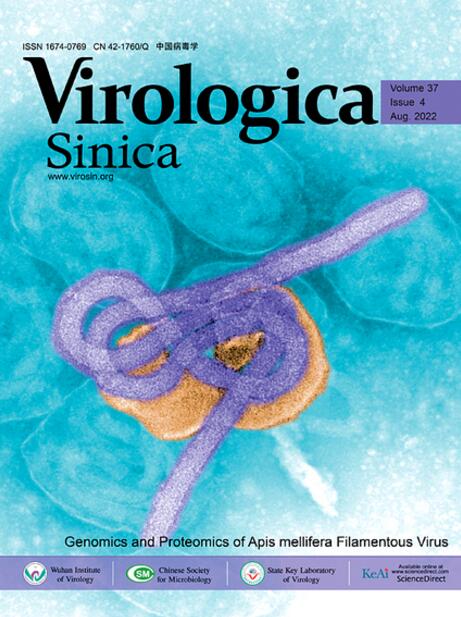Characterization of a SARS-CoV-2 infection model in golden hamsters with diabetes mellitus
IF 5.5
3区 医学
Q1 Medicine
引用次数: 0
Abstract
Being widespread across the globe, severe acute respiratory syndrome coronavirus 2 (SARS-CoV-2) keeps evolving and generating new variants and continuously poses threat to public health, especially to the population with chronic comorbidities. Diabetes mellitus is one of high-risk factors for severe outcome of coronavirus disease 2019 (COVID-19). Establishment of animal models that parallel the clinical and pathological features of COVID-19 complicated with diabetes is thus highly essential. Here, in this study, we constructed leptin receptor gene knockout hamsters with the phenotype of diabetes mellitus (db/db), and revealed that the diabetic hamsters were more susceptible to SARS-CoV-2 and its variants than wild-type hamsters. SARS-CoV-2 and its variants induced a stronger immune cytokine response in the lungs of diabetic hamsters than in wild-type hamsters. Comparative histopathology analyses also showed that infection of SARS-CoV-2 and the variants caused more severe lung tissue injury in diabetic hamsters, and may induce serious complications such as diabetic kidney disease and cardiac lesions. Our findings demonstrated that despite the decreased respiratory pathogenicity, the SARS-CoV-2 variants were still capable of impairing other organs such as kidney and heart in diabetic hamsters, suggesting that the risk of evolving SARS-CoV-2 variants to diabetic patients should never be neglected. This hamster model may help better understand the pathogenesis mechanism of severe COVID-19 in patients with diabetes. It will also aid in development and testing of effective therapeutics and prophylactic treatments against SARS-CoV-2 variants among these high-risk populations.
糖尿病金仓鼠SARS-CoV-2感染模型的建立
严重急性呼吸综合征冠状病毒2型(SARS-CoV-2)在全球广泛传播,不断演变并产生新的变体,不断对公众健康构成威胁,特别是对患有慢性合并症的人群。糖尿病是2019冠状病毒病(COVID-19)严重结局的高危因素之一。因此,建立符合新冠肺炎合并糖尿病临床和病理特征的动物模型是非常必要的。在本研究中,我们构建了具有糖尿病表型(db/db)的瘦素受体基因敲除仓鼠,发现糖尿病型仓鼠比野生型仓鼠更容易感染SARS-CoV-2及其变体。SARS-CoV-2及其变体在糖尿病仓鼠的肺部诱导的免疫细胞因子反应比野生型仓鼠更强。比较组织病理学分析还显示,感染SARS-CoV-2及其变体可导致糖尿病仓鼠更严重的肺组织损伤,并可能诱发糖尿病肾病和心脏病变等严重并发症。我们的研究结果表明,尽管呼吸致病性降低,但SARS-CoV-2变异仍然能够损害糖尿病仓鼠的其他器官,如肾脏和心脏,这表明SARS-CoV-2变异对糖尿病患者的风险绝不应被忽视。该仓鼠模型可能有助于更好地了解糖尿病患者重症COVID-19的发病机制。它还将有助于在这些高风险人群中开发和测试针对SARS-CoV-2变体的有效疗法和预防性治疗。
本文章由计算机程序翻译,如有差异,请以英文原文为准。
求助全文
约1分钟内获得全文
求助全文
来源期刊

Virologica Sinica
Biochemistry, Genetics and Molecular Biology-Molecular Medicine
CiteScore
7.70
自引率
1.80%
发文量
3149
期刊介绍:
Virologica Sinica is an international journal which aims at presenting the cutting-edge research on viruses all over the world. The journal publishes peer-reviewed original research articles, reviews, and letters to the editor, to encompass the latest developments in all branches of virology, including research on animal, plant and microbe viruses. The journal welcomes articles on virus discovery and characterization, viral epidemiology, viral pathogenesis, virus-host interaction, vaccine development, antiviral agents and therapies, and virus related bio-techniques. Virologica Sinica, the official journal of Chinese Society for Microbiology, will serve as a platform for the communication and exchange of academic information and ideas in an international context.
Electronic ISSN: 1995-820X; Print ISSN: 1674-0769
 求助内容:
求助内容: 应助结果提醒方式:
应助结果提醒方式:


